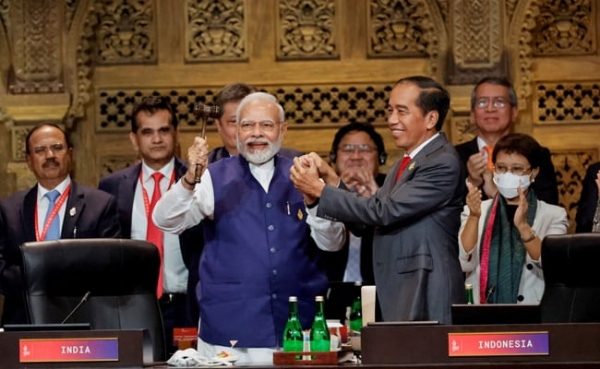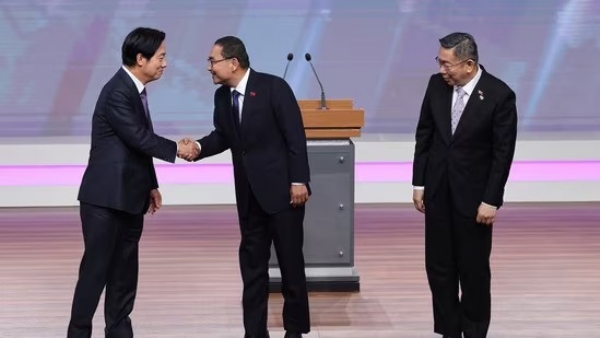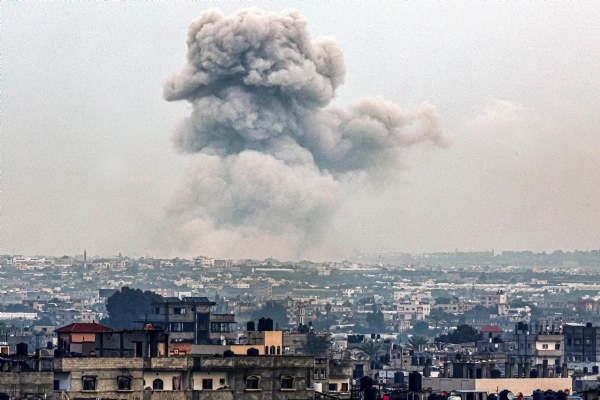#SecurityScan 70: ULFA's Peace Accord with Centre, Indian Navy's deployment of Warships in Arabian sea and more
Regular reviews and updates to security protocols and capabilities are necessary to stay ahead of potential threats.
This article is a summary of important events that have taken place in last one week affecting, India's national security.
NEWS IN BRIEF
ULFA signs peace accord with Centre, Assam govt; Amit Shah assures time-bound implementation of pact
The United Liberation Front of Assam (ULFA)’s pro-talks faction on Wednesday signed a tripartite peace accord with the Centre and the Assam government in the presence of Union Home Minister Amit Shah who assured time-bound implementation of pact.

Israel embassy blast: Delhi Police to file FIR as 'crucial proof' of conspiracy to threaten Israeli envoy found
After conducting a three-day inquiry into the explosion near the Israeli Embassy in Delhi, sources have reveal that the Delhi Police is set to file an FIR in the case. The decision comes in the wake of the discovery of 'crucial evidence' indicating a conspiracy to threaten the envoy.
Economy Security
Sensex and Nifty 50 have reached unprecedented heights, marking an almost 8% surge in December.
The domestic market is witnessing a wave of positivity, with both key equity benchmarks consistently maintaining positive trends for the last four trading sessions. December has seen a remarkable 7% increase, building on the substantial 5% gain from the preceding month.
Five factors are identified as significant contributors to the heightened market sentiment. Firstly, hopes of a rate cut in the US have intensified as inflation cools, leading market participants to aggressively invest in stocks. Secondly, India's robust growth outlook, with Fitch Ratings anticipating resilient GDP growth of 6.5% in 2024-25 and a growth momentum expected to sustain in the coming quarters.
Thirdly, strong FPI buying has been evident, with foreign investors injecting substantial funds into the Indian financial market since November. As of December 26, FPIs have infused about ₹78,903 crore in December alone. Fourthly, the role of retail investors has become increasingly prominent, with a rising population contributing to the domestic market's resilience, countering foreign investors' selling pressure.
Lastly, there is a noticeable shift of money toward large-cap stocks. After substantial gains in mid and small-caps, investors are now opting for large-caps due to perceived valuation comfort. Analysts advise prioritizing high-quality blue-chip stocks with good earnings visibility, emphasizing the evolving dynamics of the market.
India's Rise as a Stock Market Superpower: Joining the $4 Trillion Club
In recent years, India has emerged as a formidable player in the global economy, and its stock market's remarkable growth is a testament to its potential. Surpassing the significant milestone of a combined market value of $4 trillion, India has firmly established itself as a stock market superpower. This essay explores the factors behind India's stock market success, the implications of joining the $4 trillion club, and the country's future prospects.
The Factors Driving India's Stock Market Success:
Robust Economic Growth: India's steady economic growth, driven by structural reforms, a burgeoning middle class, and a thriving entrepreneurial ecosystem, has positioned it as an attractive investment destination. The country's GDP growth rate, demographic dividend, and expanding consumer market have boosted investor confidence.
Policy Reforms and Investor-Friendly Environment: The Indian government's proactive approach in implementing policy reforms has enhanced the ease of doing business and investor sentiment. Initiatives such as the Goods and Services Tax (GST), the Insolvency and Bankruptcy Code (IBC), and the Make in India campaign have attracted both domestic and foreign investors.
Technological Advancements: India's adoption of advanced technologies, particularly in the fintech sector, has revolutionized the stock market ecosystem. Digital trading platforms, online brokerage services, and increased access to information have democratized market participation, attracting a broader investor base.
Demographic Advantage: With a young and growing population, India possesses a significant demographic advantage. This demographic dividend translates into a large consumer base, increased productivity, and a vibrant entrepreneurial culture, all of which contribute to the country's economic growth and stock market performance.
Implications of Joining the $4 Trillion Club:
Increased Global Recognition: India's ascent into the $4 trillion club places it alongside leading economies such as the United States, China, and Japan. This achievement enhances India's global standing and attracts further attention from international investors, paving the way for increased foreign direct investment (FDI) inflows.
Market Expansion and Wealth Creation: The growth of India's stock market not only benefits investors but also facilitates the expansion of businesses. Companies can raise capital for expansion and innovation, leading to job creation, increased productivity, and overall economic development. The rising stock market value contributes to wealth creation among investors, fostering a culture of investment and financial inclusion.
Strengthened Capital Markets: A robust stock market strengthens the overall financial ecosystem of a country. India's growing market capitalization enhances the depth and liquidity of its capital markets, allowing for more efficient capital allocation and encouraging businesses to access financing through equity markets. This, in turn, promotes entrepreneurship, innovation, and economic growth.
Future Prospects and Challenges:

Continued Economic Reforms: Sustaining India's stock market growth requires a continued focus on economic reforms, including further ease of doing business measures, streamlining regulatory processes, and promoting investor-friendly policies. Policy stability and predictability will instill confidence among investors and attract long-term capital.
Infrastructure Development: Adequate infrastructure development, including transportation networks, logistics, and digital connectivity, is crucial for sustained economic growth and the efficient functioning of capital markets. Investments in infrastructure will unlock new opportunities and ensure seamless market operations.
Risk Management and Investor Protection: As India's stock market expands, ensuring robust risk management mechanisms and investor protection becomes crucial. Strengthening regulatory oversight, promoting transparency, and enhancing corporate governance practices will bolster investor confidence and mitigate potential risks.
Inclusion and Financial Literacy: Encouraging financial inclusion and promoting financial literacy are essential for broadening market participation. Initiatives aimed at educating investors, particularly in rural areas, and expanding access to financial services will enable a more inclusive and resilient stock market ecosystem.
India's remarkable achievement of joining the $4 trillion club reflects its growing stature as a stock market superpower. The country's robust economic growth, policy reforms, technological advancements, and demographic advantages have propelled its stock market to new heights. India's ascent as a stock market superpower holds immense potential for wealth creation, economic development, and the overall prosperity of the nation.
Proactive Diplomacy Protecting Indian National Security
2023: A Year Marked by Diplomatic Triumphs and Summits
India, positioned as a crucial link between the North and the South and a mediator between democracies and perceived autocracies, emerged as a highly esteemed partner in the global arena in the year 2023. Despite occasional disagreements on certain aspects of its foreign policy, India played a pivotal role in numerous bilateral and multilateral summit meetings throughout the year. These gatherings not only provided opportunities to fortify India's relations with major nations but also allowed it to actively contribute to multilateral forums. India's commitment to dialogue and diplomacy in resolving international differences resonated strongly, bolstered by robust leadership, economic growth, and a heightened aspiration to play a more significant role in global governance.
The international community paid keen attention to India's voice, acknowledging its strategic autonomy that expanded diplomatic possibilities and facilitated a balanced pursuit of national interests. India's unique role as a bridge between the North and the South, as well as between democracies and autocracies, solidified its standing as a valued partner on the global stage.

One of the crowning achievements of India's diplomatic endeavors in 2023 was the successful hosting of the G20 summit during particularly challenging times. The conflict in Ukraine, primarily a matter of European security, reverberated globally, particularly affecting the Global South. Stringent sanctions imposed on Russia by the US and its allies disrupted food, fertilizer, and energy supplies. Throughout this crisis, India's G20 presidency showcased its adept handling of complex geopolitical issues, demonstrating resilience and diplomatic finesse. The determination of the international community to condemn Russia in various forums, including the UN, underscored the gravity of the situation that India navigated skillfully during its tenure as the G20 leader
Biden Visit For 26 Jan cancelled due to Khalistani terrorists Pannu: Cancellation No Big Deal
On December 19, when the Biden administration conveyed that President Biden would be unable to attend Republic Day and a potential Quad summit, some voices quickly painted the situation as a harbinger of the deteriorating India-US relationship. Assertions ranged from questioning the partnership's fragility to speculating on its impending demise, with doubts raised about New Delhi's perception of Biden as an ally. The familiar narrative of American fickleness emerged, suggesting that the US could align with Pakistan or China at the slightest provocation. The catalyst for this perceived strain was the Pannun case, involving the Khalistani terrorist threat.
The seeds of doubt about India were planted by some Indian origin people in the US, and the American ignorance about India has been doing the rest of the job.
The question on Indian minds is, whether, the Biden White House has the appetite and the competence to rein in the anti-India lobbies and interest groups in Washington D.C., as well as those in Biden’s own administration running their agendas against India.
Ensuring Indian Maritime Security
Indian Navy deploys warships in Arabian Sea following drone attack on cargo vessel
In response to recent attacks on commercial vessels in the Arabian Sea, the Indian Navy has deployed three warships to maintain a deterrent presence. The Navy is investigating a drone strike on the Mangalore-bound cargo vessel MV Chem Pluto. The vessel, carrying crude oil, was attacked about 217 nautical miles from Porbandar.
Will find attackers of merchant navy ships even from depths of seas and take strict action: Rajnath Singh
"The Indian government has taken the drone attack on MV Chem Pluto and attack on MV Saibaba in the Red Sea seriously. We will find those who executed the recent attacks on merchant navy ships even from the depths of the seas and take strict action against them," Singh said.

To protect its shipping from drone attacks and missile attacks in the exclusive economic zone (EEZ), India can take several steps. Here are some measures that the country could consider implementing:
Enhanced Maritime Surveillance: Strengthening maritime surveillance capabilities is crucial to detect and track potential threats in the EEZ. India should invest in advanced radar systems, coastal surveillance networks, and aerial surveillance assets like maritime patrol aircraft and unmanned aerial vehicles (UAVs). These assets can provide real-time situational awareness and early warning of any approaching threats.
Establishing an integrated command and control system can facilitate efficient coordination and response to maritime security incidents.
Anti-Drone Systems: Deploying anti-drone systems can help detect, track, and neutralize hostile drones operating in the EEZ. These systems can employ technologies like radar, electro-optical sensors, and radio frequency detection to identify and counter unauthorized drones.
Air Defense Systems: Installing air defense systems, such as surface-to-air missiles and close-in weapon systems, on naval vessels and strategic locations along the coast can provide an effective deterrent against missile attacks.
Maritime Patrol and Interception: Increasing the presence of naval assets, including warships and patrol vessels, in the EEZ can help deter and intercept potential threats.
Public-Private Partnerships: Collaborating with the private sector, especially shipping companies, can help improve maritime security. Encouraging the adoption of best practices, such as enhancing onboard security measures, conducting risk assessments, and providing training to crew members, can contribute to a more secure maritime environment.
Legal Framework and International Conventions: Strengthening the legal framework related to maritime security and ensuring compliance with international conventions is vital. This includes implementing measures to counter piracy, terrorism, and other maritime crimes, as well as ratifying and adhering to relevant international agreements and protocols.
Regular reviews and updates to security protocols and capabilities are necessary to stay ahead of potential threats.
Navy's MiG-29K aircraft suffers tyre burst at Dabolim airport; passenger flights hit
An Indian Navy fighter jet, the MiG-29K, experienced a tyre burst while taxiing at Dabolim airport in Goa. No injuries occurred, but the incident caused the aircraft to be stranded on the taxiway. The airport's runway closure until 4 pm affected passenger flights due to this routine sortie delay.
INS Imphal, India's first warship named after northeast city commissioned:
The Indian Navy commissioned its latest stealth-guided missile destroyer, INS Imphal, in Mumbai. This warship, the first to be named after a city from the northeast, can launch extended-range supersonic BrahMos missiles. Chief of Naval Staff Admiral R Hari Kumar highlighted the significance of naming the warship after Imphal, emphasizing unity and the multicultural ethos of the Indian Navy.
Countering External & Internal Security Challenges
Centre rejects Parliamentary panel idea to share glacier data with China
The report, 'Glacier Management in the Country - Monitoring of Glaciers / Lakes Including Glacial Lake Outbursts leading to Flash-Floods in the Himalayan Region' recommended in March that the Department of Water Resources, River Development and Ganga Rejuvenation "take up the matter with the Ministry of External Affairs" to have some kind of multilateral agreement with neighbouring countries for sharing information on the changing state of glaciers and the threats posed by them. It sought to be apprised of the steps taken by the department within three months of the presentation of the report.

Sri Lanka considers permission freeze for Chinese 'spy' ships
Sri Lanka will likely see presidential, general, and local government elections in 2024. The year will also bring an International Monetary Fund (IMF) review and is expected to be a "year of recovery" following the unprecedented economic crisis, which saw Sri Lanka declare bankruptcy last year. There is a pattern in Chinese activities through its ships in Sri Lankan waters and Colombo in the past succumbed to pressure from Beijing, given Lanka's indebtedness, said people familiar with the Chinese strategy.
Army to deploy more troops in Poonch belt
The Indian Army is reportedly increasing troop deployment in the Rajouri-Poonch sector following a surge in attacks on security personnel and heightened activity by Pakistan-based terrorists. The additional forces are aimed at cracking down on terror modules that have escalated attacks in the region. There are suspicions of a nexus between Pakistan and China to revive terrorism in the sector, potentially pressuring the removal of troops from Ladakh.
Defence sector company Bharat Electronics bags orders worth Rs 445 cr from UP government
This contract signed last week, will provide "comprehensive and state-of-art hardware, AI-based software tools and cyber security solutions" for the Dial 112 project of the Uttar Pradesh government, which is an emergency response system.
BSF hits a century, shoots down 100 Pakistani drones in 2023
In a notable achievement, the Border Security Force has successfully intercepted and neutralized 100 Pakistani drones attempting to smuggle narcotics and contraband into Indian territory in 2023.
Cannot have old wine in new bottles and expect new results, says India as it reiterates call for UNSC reforms
"Upon India's initiative, the African Union became a permanent member of the G20 at the New Delhi Summit in September, thus ensuring that an important and valuable voice from the Global South is added to an influential institution of global governance and decision-making. It was India's firm conviction that with Africa's full participation in the G20, this group would truly be a more representative and relevant institution," Kamboj said.
#COUNTERING CHINESE MULTI DOMAIN , GREYZONE, HIGHBREED WARFARE
Here's why the Indian Ocean could be a weak point for China in its war against Taiwan
In the context of a possible conflict with Taiwan, China's vulnerability in the Indian Ocean looms large. The passage of essential oil tankers faces grave risks, lacking adequate protection, air support, or secure bases. This weakness poses a spectrum of threats, from disrupted shipping routes to potential blockades, impacting China's crucial oil supply. Despite efforts to fortify its presence, uncertainties prevail, raising concerns about China's military capabilities in this strategic theater.
Taiwan elections: Mainland China accuses Democratic Progressive Party of ‘hyping’ up military threat to win votes

The island will elect its next president in January, with William Lai, the independence-leaning party’s candidate, currently ahead in the polls
PLA spokesman Wu Qian said accusations was interfering in the election were an attempt to ‘gain votes through lies.
Taiwan investment in China plummets as it soars in U.S. and Germany
Taiwanese investment in China plunged in 2023 to just over 10% of the island's total outbound direct investment, the lowest share in decades and well below its fast-growing spending in the U.S. and Germany.
Even as Taiwan's approved foreign direct investment between January and November jumped 87% on the year to $25.7 billion, investment in China slumped 34% to $2.9 billion, making up just 12% of the total, official Taiwanese data shows.
The drop-off stems from China's economic doldrums as well as from the influence of the long-standing and mounting tensions between the two sides. Taiwanese companies are also finding it harder to do business on the mainland amid the friction between Washington and Beijing that has led to American duties on Chinese goods.
#HAMAS ISRAEL WAR #LESSONS FOR INDIA
Putin says some 244,000 Russian troops are fighting in Ukraine, offering a rare detail
Russian President Vladimir Putin announced that approximately 244,000 Russian troops are currently engaged in the conflict in Ukraine. He emphasized that further mobilization isn't required, citing the recruitment of 1,500 soldiers daily. Putin also revealed that 486,000 soldiers have signed contracts with the Russian military. His statement highlighted Moscow's ongoing objectives in Ukraine, focusing on "de-Nazification, de-militarization, and a neutral status" for the country.
Israeli Air Strike in Syria kills senior Iranian Revolutionary Guards member

An Israeli air strike near Damascus killed Sayyed Razi Mousavi, a senior adviser in Iran's Revolutionary Guards, responsible for coordinating the military alliance between Syria and Iran. The strike targeted Iran-linked targets in Syria, a region where Tehran's influence has increased since supporting President Bashar al-Assad in the Syrian war.
Israel's cost of war: $14 billion, tripling deficit
Briefing lawmakers, the ministry's deputy budget commissioner Itai Temk in said the war was expected to stretch at least two months into 2024, adding 30 billion shekels for security and another 20 billion for civilian and other expenses
--
Total Views |


